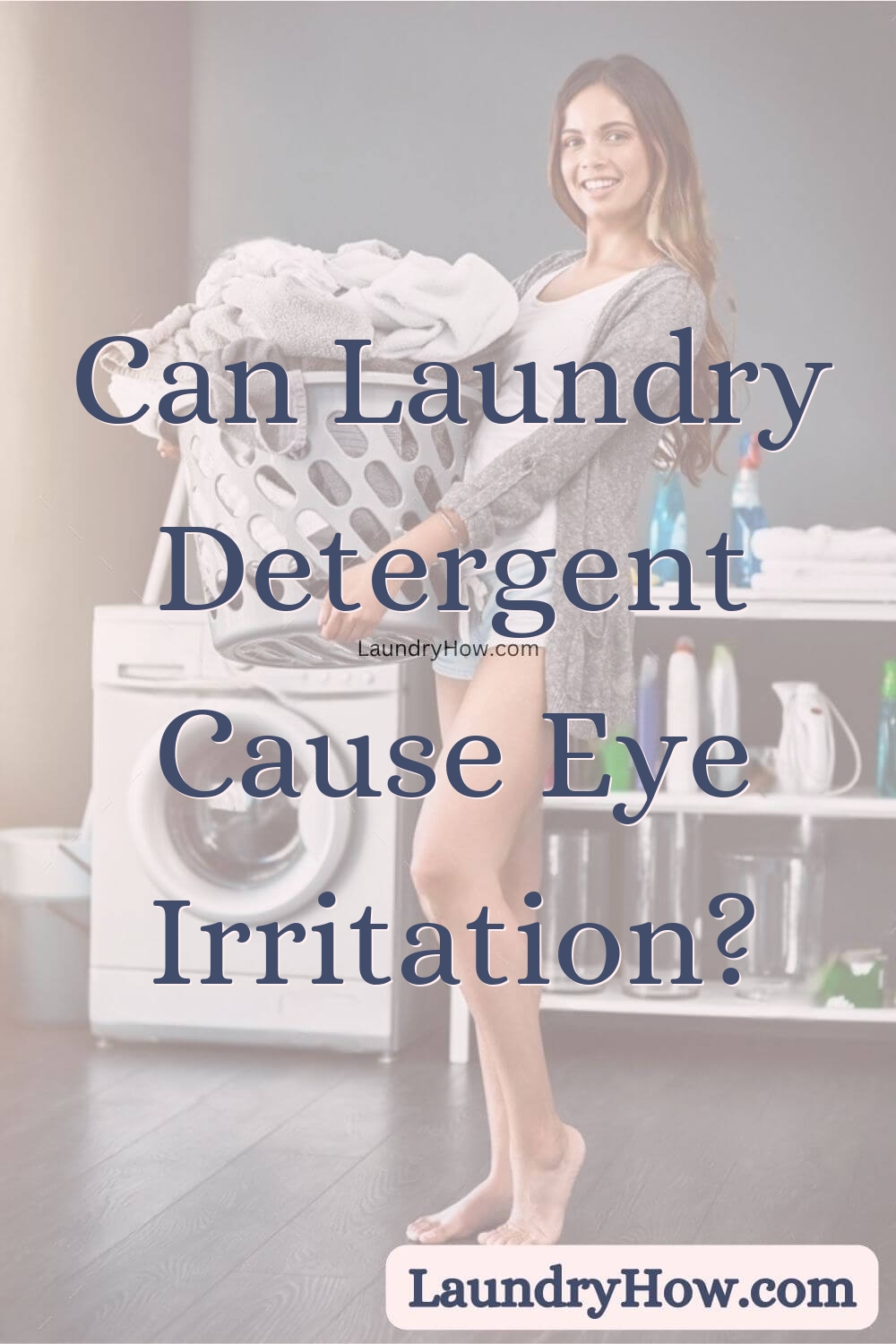Laundry detergent is a common household product that most of us use on a regular basis. But if you’ve ever gotten some in your eyes accidentally, you know it can be quite unpleasant! The burning, stinging sensation leaves you desperately rinsing your eyes at the sink.
This leads to the question – can laundry detergent actually cause damage to your eyes with repeated exposure? Or is the irritation just temporary? Let’s take a closer look.
What’s in Laundry Detergent That Causes Irritation
Modern laundry detergents contain a variety of ingredients that work together to clean fabrics. Some of the key ingredients are:
Surfactants
Surfactants are chemicals that help lift dirt and oils off of clothing by reducing water’s surface tension. The most common surfactants found in laundry detergent are:
- Linear alkylbenzene sulfonates (LAS)
- Alcohol ethoxylates
- Lauryl sulfates
These powerful cleaning agents are also quite harsh. When they get into your eyes, they can disrupt the oils and membranes, causing significant irritation.
Builders
Builders are water softening agents that allow the surfactants to work better in hard water. Common options like phosphates and Zeolite can irritate eyes.
Bleaches
Bleaches help remove stains by breaking down pigments and whitening fabrics. Chlorine and oxygen bleaches are typical varieties with irritation potential.
Fragrances & Dyes
Artificial fragrances and dyes round out most mainstream detergents. These additions have less impact on cleaning power but make the products more aesthetically pleasing. The fragrances in particular can aggravate sensitive eyes.
The Extreme pH Level Is the Root Issue
Laundry detergents need to be highly alkaline to dissolve oils and lift dirt. Premium brands often boast a pH of 10-12 during the wash cycle. For comparison, the pH of healthy eyes is around 7.2-7.5. When this highly alkaline liquid splashes into the neutral pH environment of your eyes, it disturbs the delicate balance. This triggers pain receptors and inflammation as your eyes try to return to normal pH. The more extreme the pH difference, the more irritation occurs.
What Kind of Eye Damage Can It Cause?
Now that we know how laundry detergent irritates eyes when you get it in them accidentally, what kind of lasting damage can it inflict? Here’s an overview:
Temporary Issues
If you thoroughly rinse detergent out of your eyes promptly, the most common effects are temporary:
- Redness
- Burning / stinging
- Blurred vision
- Excess tear production
These symptoms usually clear up on their own within a few hours. Using an eye wash can help speed relief.
Corneal Abrasion
If the detergent dries on the surface of the eye or you rub aggressively, it’s possible to experience a corneal abrasion. This is a minor scratch or scrape on the transparent cornea. Symptoms include:
- Feeling like something is stuck in your eye
- Significant pain that gets worse when blinking
- Light sensitivity
- Watery eye
- Headache on the affected side
Corneal abrasions require medical attention but generally heal fully within 2-3 days.
Damage to Conjunctiva
The thin membrane lining the inside of the eyelid and white part of the eye is called the conjunctiva. Laundry detergent can cause burning and inflammation of this surface if exposure is more than a quick splash. Long term issues are unlikely with prompt treatment.
Chemical Burns
Worst case, highly concentrated detergent or failure to rinse promptly can cause actual chemical burns. This can damage the conjunctiva, cornea, eyelid, and other delicate eye structures. Chemical burns lead to:
- Excruciating, throbbing pain
- Nausea
- Severe redness and inflammation
- Permanent vision impairment
Seeking emergency medical care is critical for the best chance of recovery.
How to Avoid Eye Injuries from Laundry Detergent
Now that you know laundry detergent can certainly irritate eyes and even cause lasting damage in severe cases, it’s wise to take some simple precautions:
Wear Protective Eyewear
When pouring or handling laundry detergent, wear safety glasses or goggles to shield your eyes. Disposable options are inexpensive and readily available.
Read Instructions Carefully
Follow usage directions precisely and never dump detergent straight from the box into the washing machine. Measuring cups help avoid spills and splashes during the pouring process.
Consider Gentler Formulas
Choose low-fragrance, dye-free options or all-natural brands like Seventh Generation that feature milder ingredients. While no less effective at cleaning, they tend to provoke less irritation overall.
Don’t Rub Your Eyes
If detergent does get into your eyes somehow, flush immediately with clean, tepid water. Resist the urge to aggressively rub, as this can worsen injury. Seek medical attention if pain persists beyond a few minutes.
The Bottom Line – Better Safe Than Sorry
Laundry detergent is made of potent ingredients that can definitely cause temporary or even lasting eye damage in rare cases. However, you can easily reduce the risks by using common sense precautions. When in doubt, err on the side of caution and safe handling to keep your vision healthy.
References:
American Academy of Opthalmology (2018). Chemical injuries of the eye. https://www.aao.org/eye-health/diseases/chemical-injuries-eye
Kellogg Eye Center Michigan Medicine (2019). Ocular detergent injuries. https://www.umkelloggeye.org/conditions-treatments/ocular-detergent-injuries
Rosenfield, M. and Logan, N. (2009). Optometry: Science, techniques and clinical management. Elsevier Health Sciences.

Laura has had an enthusiasm for laundry ever since she was a teenager experimenting with wash cycles. She went on study textile science in college before working in product testing.
Soon, Laura found friends and family constantly asking her laundry advice, realizing she had become an unofficial laundry guru. The questions kept coming in, so Laura decided to start sharing laundry tips online to help more people. The enthusiastic response led her start the blog “Laundry How”.
Now in her late thirties, Laura uses Laundry How to tackle all kinds of laundry topics – stains, fabric care, detergents, and more. She provides advice from both her studies and experience testing techniques out firsthand. Laura continues to grow an engaged community of laundry learners, feeling fulfilled empowering people to make laundry an easy, confidence-building ritual rather than a dreaded chore.
